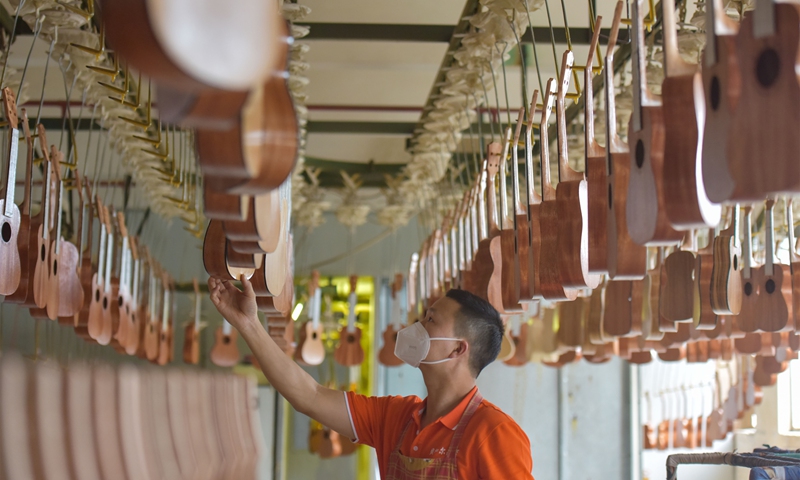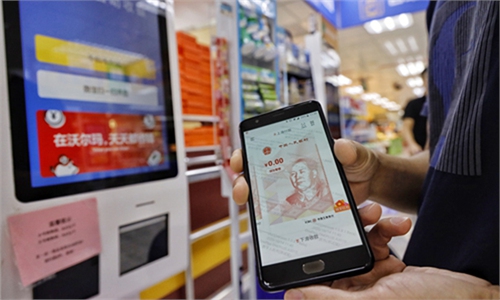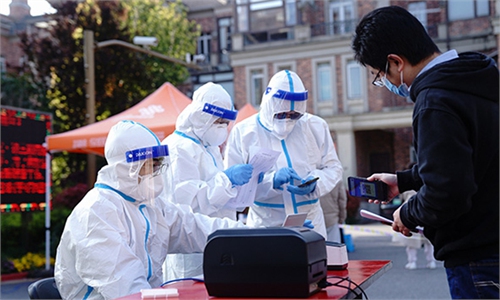Chinese exporters see bigger fluctuations in yuan’s exchange rate, benefit from government support
Trade sector to grow steadily on govt support

An employee works in a guitar industrial park in Zheng'an county, Southwest China's Guizhou Province, on April 13, 2022. Zheng'an is known as the "guitar capital of China." There are more than 100 guitar producers and supporting enterprises in the park, and the guitars are exported to more than 40 countries and regions, such as Brazil. Photo: VCG
Despite mounting uncertainties on China's trade sector arising from setbacks like a fluctuating yuan, the coronavirus outbreaks and other adverse factors, industrial insiders and experts are looking for steady trade growth this year, as overseas clients moved to replenish inventory and as the government continued to support private companies with a rollout of stimulus policies, which has enhanced businesspeople' s confidence and ability to tackle setbacks.
One major uncertainty facing exporters is the intensifying fluctuations in the yuan's exchange rate, which lead to stronger exchange losses or gains to their businesses.
The yuan has steeply declined against the US dollar since mid-April. On Fri-day, the offshore yuan once slipped below 6.73 against the US dollar, while onshore yuan sank below 6.69, both the lowest since November 2020.
The trend had benefitted certain trade companies that settle payments in dol-lars. Duan Lianmin, a manager of a Shenzhen-based glass factory, told the Global Times on Friday that the company has made extra profits from the yu-an's depreciation.
"Our businesses with foreign clients are settled in dollars and in the past two weeks, we have gained 4 to 5 percentage points compared to last month," she said.
Duan's factory mainly exports to Southeast Asia, South Korea, South Africa and the Middle East.
However, companies that settle payments in euro are seeing another picture. The euro is on a steady decline against the renminbi since mid-2020.
A report from Caijing magazine also cited an online cross-border exporter as saying that his exchange losses in 2021 accounted for at least 10 percent of his company's total income. The company settled payments in euro.
The drastic fluctuations in the yuan's exchange rate are a result of a turbulent external environment with "black swans" like the Ukraine crisis, and they are expected to bring more uncertainties to the business of domestic traders.
But many companies also took moves to diminish the impact of such fluctua-tions on their business. For example, Cai Qinliang, secretary-general of the Industry Association of Christmas Supplies in Yiwu in East China's Zhejiang Province, told the Global Times on Friday that the yuan's volatility had almost no impact on the business of Yiwu's Christmas products exporters, because most of them settle payments in yuan.
"We don't accept the US dollar to avoid possible exchange rate fluctuations," he told the Global Times on Friday.
The Global Times also learned from him that despite external difficulties, Christmas garment sellers in Yiwu still saw better business compared to last year, as orders surged by at least 10 percent in the first four months this year.
"Last year, logistics was not smooth because of the pandemic. This year, overseas clients' inventory is almost empty, and they need to replenish," he said.
Many clients also placed orders ahead of time this year to avoid the potential rise in shipment fees, which also benefited their business.
Support from the government is another bright side of the situation. According to Cai, the Yiwu city government is encouraging local companies to resume production and keep logistics unclogged.
Chinese officials mapped out measures to help traders overcome difficulties at a State Council meeting on Thursday. The measures include the confirma-tion of a directory of key overseas trade companies and provide them with safeguards in areas like production, logistics and employment.
The government also vowed to increase credit support for smaller trade com-panies, such as increasing the scale of short-term export credit insurance and stabilizing the yuan's exchange rate.
Experts said that China's export sector faced certain adverse factors this year, but the general environment has not largely deteriorated so far.
"The Russia-Ukraine conflict would exert some negative impact on China's exports, but only to a limited extent. In general, China's trade growth should be similar to last year's level," Gu Xiaosong, dean of the ASEAN Research Institute of Hainan Tropical Ocean University, told the Global Times on Friday.
Hu Qimu, chief research fellow at the Sinosteel Economic Research Institute, stressed that overseas demand should not be as strong as last year, as some orders would flow back to other Asian economies with their work resumption.
"But the possibility of the US cutting tariffs on China, as well as rising orders from Asian countries after the implementation of the Regional Comprehensive Economic Partnership, are two favorable forces for this year's trade growth," he said, predicting that China's exports could still achieve double-digit growth this year.
He said the "Gray Rhino" of the Omicron outbreak has not been removed so far, which casts uncertainties on China's general economic performance.
"The pressure on China achieving the 5.5 percent GDP growth is relatively high and depends on the future development pattern of the coronavirus," he said. He added that in a good scenario, GDP growth is expected to touch bot-tom in the second quarter and start to rebound in the third, while infrastruc-ture investment would help bolster economic growth to a desired level.



